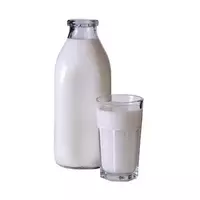Cow's milk

The most common and best-selling animal milk is cow's milk, which has an annual global commodity production of approximately 700 million tons. Milk of cows has been consumed for more than one thousand years, since this animal was tamed by man.
Milk is of great importance for dietary and nutrition. With a low calorie content of cow's milk, which is about 62 kcal, this product is great for people who are not indifferent to their appearance. It is this species that is associated with the word "milk" and fills the shelves of almost all stores where it is sold under the names "pasteurized milk" and "sterilized milk. " In cooking, the nutritional properties of cow's milk are used in the preparation of a variety of dishes and drinks. In addition, it is from this milk that various mixtures are made for feeding babies.
Composition of cow's milk
In addition to the huge amount of vitamins, cow's milk includes a number of useful minerals: calcium, potassium, phosphorus, magnesium, chlorine, sodium, sulfur, chlorides, phosphates and citrates.
Calcium is undoubtedly the most important macronutrient that is present in the milk of cows in a form easily digestible for the body. The content of phosphorus, potassium and sodium in the composition of cow's milk is almost always constant, and varies very slightly depending on the time of year.
Fat content of cow's milk
Traditionally, the average fat content of cow's milk is
3. 5%. To obtain a more fat-rich beverage, milk is mixed with cream in a certain proportion. For production of practically defatted liquid it is connected with defatted milk of cow. At home, in order to reduce the fat content of cow's milk, it is recommended to boil or dilute it with water before consumption. But still, fat content is not the main indicator for drinking this drink.
The benefits of cow's milk
The benefits of cow's milk, like the drink itself, have been known since time immemorial, when it was ranked as a valuable nutritious food. After all, then no one knew that it included more than 200 nutrients, the main of which could be called proteins, fats and carbohydrates. In addition, vitamins and minerals also play an important role and are present in cow's milk in excess, ensuring the normal vital activity of the body with the regular use of this product.
Many do not unreasonably believe that the most valuable food substance, due to which the benefits of cow's milk are obvious, are proteins, since they contain all the necessary amino acids. Milk sugar has a beneficial effect on digestion processes, and the minerals found in milk are simply indispensable for updating blood cells and normal bone formation.
Harm to cow's milk
Despite all the positive qualities, the debate about the dangers of cow's milk is still relevant, and scientists have never come to a consensus. Some nutritionists argue that milk is absorbed by the adult body much more difficult than the baby's body. This is due to the fact that the adult's stomach stops producing a certain enzyme, which is responsible for the complete absorption of this drink. In addition, there are many people who do not tolerate cow's milk at all since birth.
cow's milk 62 kCal
The energy value of cow's milk (Ratio of proteins, fats, carbohydrates - ju):
Proteins: 2.9 g (~ 12 kCal)
Fats: 3.5 g (~ 32 kCal)
Carbohydrates: 4.7 g (~ 19 kCal)
Energy ratio (b | y): 19% | 51% | 30%
 Español
Español Français
Français Português
Português Русский
Русский 简体中文
简体中文 繁體中文
繁體中文 日本語
日本語 한국어
한국어 العربية
العربية Türkçe
Türkçe Қазақ
Қазақ Deutsch
Deutsch Italiano
Italiano Українська
Українська
